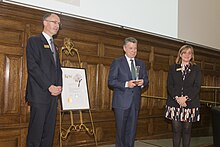| Kew International Medal | |
|---|---|
 Kew International Medal awarded to Juan Manuel Santos, President Santos of Colombia in 2017 with Richard Deverell and Kathy Willis | |
| Awarded for | “significant contributions to science and conservation” [1] |
| Sponsored by | Royal Botanic Gardens, Kew |
| Location | London |
| Website | www |
The Kew International Medal is an award given to individuals who have made a significant contribution to science and conservation. [1] The award was first established in 1992 by the Board of Trustees of the Royal Botanic Gardens, Kew. [1]